In a camouflaged, forest hideout, it is difficult to find delicacies similar to a five-star hotel. And with an empty belly - it is even more difficult to fight the invader effectively. Fortunately, our boys knew very well how to remedy this situation.
The partisans of the Home Army marched for hours, digging dugouts, carrying weapons and ammunition, engaging in skirmishes with the enemy. Such increased activity meant that their nutritional needs were, to put it mildly, considerable. To cope with them and to feed the soldiers solidly, the quartermaster had to be healthy.
Natural allies
The partisans went to buy provisions, among others, from their natural allies - Polish foresters. Those who knew the forest like their own pocket and were involved in the underground with great commitment since the beginning of the war, never refused.
Many of them even belonged to the paramilitary organization Military Training for Foresters before the war, and during the occupation they used the knowledge they gained there.
The workers felling trees for the needs of the Germans were entitled to food allowances, and the foresters were responsible for issuing the rations. As noted in his memoirs by the Home Army soldier Zbigniew Zieliński, the conspirators decided to take advantage of it.
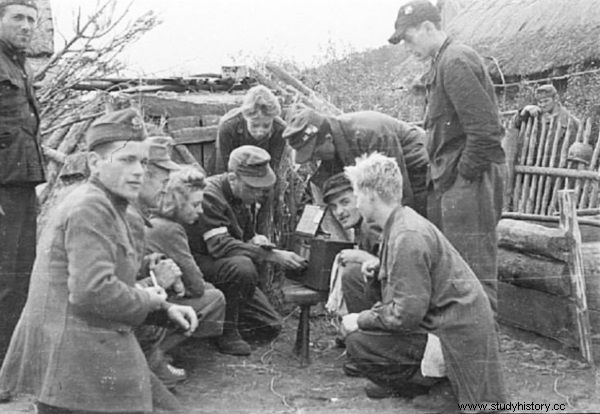
Partisans are listening to the radio in Kampinos (public domain).
Hundreds of people who worked in the woods, but with weapons in their hands began to appear on the lists of people who were right. And against the Germans, not on their behalf.
In the case described by Zieliński, the list swelled twice. Lard, oil, sugar, vodka and cigarettes were to be enough for both manual workers and the branch stationed in the forest.
two people from the underground went to the warehouse for provisions - a forest apprentice and the son of a ranger with raw the commandment not to take anything incriminating with them, especially weapons. After all, there is no point in provoking the Germans, and apart from them, they are all around them.
When the food was taken from the warehouses and the men returned to the forester's lodge ... they were attacked by a partisan unit from the rival People's Army . They were robbed, but they were not hurt themselves. The matter was then cleared at a higher level and some of the allocations were returned, but what the ALs had eaten by then was theirs.
Only rob Germans!
Sometimes it was the Home Army soldiers who had to resort to taking food by force. Poles, if they could, they did not take. Their victims were primarily the Germans and the Volksdeutsche, as well as their farms, warehouses, and enterprises under their management.
This was the case when Władysław Jasiński, the famous "Jędruś" (he took the pseudonym from his son's name), appeared with his unit at the mill's doorstep in Wiązownica. In the evening, some partisans went inside and terrorized the peasants who had come to mince. After a while, they were reassured by the statement that the partisans were only interested in grain intended for the Germans. As Eugeniusz Dąbrowski noted in his book "Szlakiem» Jędrusiów «":
It stood in big bags with German inscriptions and "black crows", as the stylized emblem of the Wehrmacht was commonly called. In the mill, there was a problem of loading such a large amount of grain. Almost 10 tons - that's a lot to carry. The peasants who stayed here willingly helped with the loading of grain on the sledge.
Even a German mill overseer was dragged, unaware of anything, sleeping soundly in his apartment. When he stood in front of "Jędrus" himself, he was confused and completely surprised.
Interestingly, the Polish branch made such an impression on him that he even praised his excellent organization. Meanwhile, the grain had long since departed on a sleigh and mysteriously disappeared into the arranged hiding places.
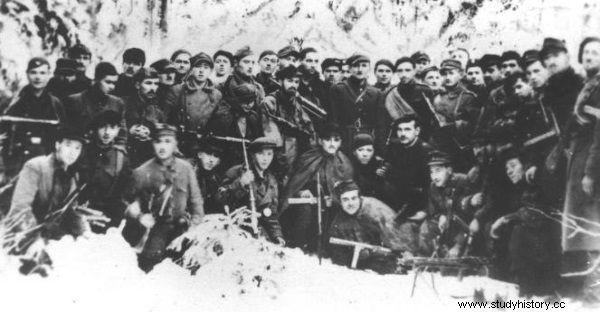
Feeding such a company was not an easy task. The photo shows the 4th company of the 2nd battalion of the 2nd Infantry Regiment of the Home Army Legions (formerly "Jędrusie"). (public domain)
The commander did not enter into unnecessary discussions. He only left a receipt for the requisition for the partisans and left with his men. Similar actions were frequent in the case of large branches.
Exactly according to the instructions
Such action was in accordance with the instructions of the Home Army Headquarters. The documents in the Archive of New Files precisely specify how the partisans were allowed to obtain food during combat operations.
The feeding of the unit in the following days takes place in the exploitation of the war booty [...]. The operating sources must be used in the following order:
- private German farms or in admin. invader.
- agri-trade cooperatives.
- farms of Polish citizens.
- feed. city warehouses.
Food resources. downloaded from the last 3 sources, can only be used through the local admin. (mayor, village leader, village administrator) and for payment in cash.
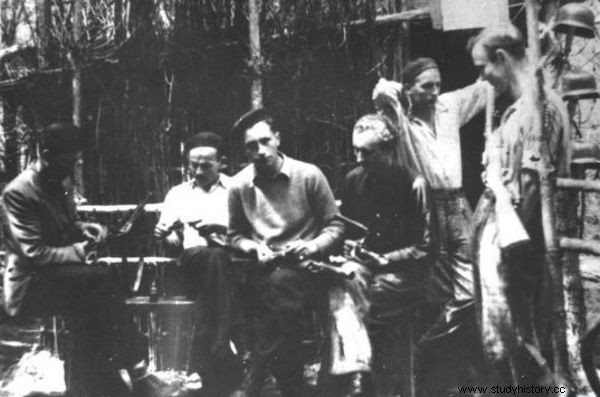
"Jędrusiów" branch in the hideout (public domain).
Once the stewards had managed to gather some supplies, they had to be properly secured. Also in this respect, the Main Command issued guidelines, including how long the individual products can be stored.
The recommendations were surprisingly detailed, for example, white flour could be stored in a dry place for eight to twelve months. Wholemeal is much shorter due to the higher water content. The document also mentions that salted lard can be kept in barrels for up to a year, cheese grated and dried similarly, and salted lard only half a year.
The supplies were to be handled by the person assigned to be the manager (in the original version) of the soldier's kitchen. One of her primary duties was to ensure that guerrilla units consumed wholesome meals.
To assist her in this, among other things, the official menu with a schedule attached to the instructions exactly how many grams of individual products each person should get. And so, for example on Sunday the soldiers were to eat vegetable soup on broth with dumplings, on Monday sorrel soup with potatoes and pearl barley, and on Tuesday millet with beans.
Court dinners
The hungry forest boys could not always enjoy the benefits of the field kitchen. After dark, they often knocked on the doors of Polish mansions that had not yet been taken over by the occupant.
Barbara Morawska's mother was a substitute for a gardener arrested by the Germans in the estate near Opoczno. The woman remembered that young, armed men came to the manor:
Later the guerrillas went through quite often, deep at night. From the window of our room in the outbuilding we could see the light in the court dining room, we could hear the piano played by the heiress's sister, legionary songs and new, unknown to us, partisan songs. The heiress would go to the piggery to select a pig.
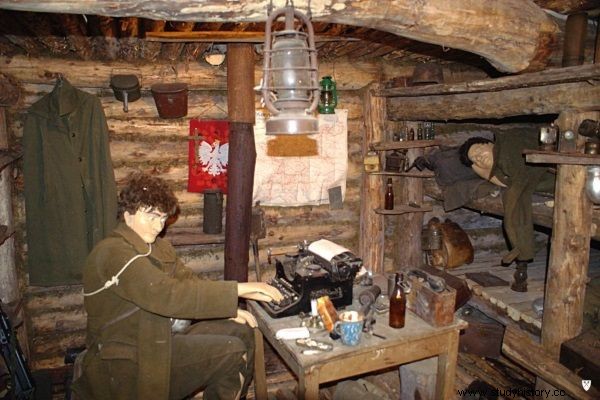
No wonder the partisans preferred to visit houses and mansions, since their forest quarters often looked like the one in the photo. (replicas of the bunker "Ptasia Wola" of the Secret Military Organization Gryf Pomorski at the Center for Education and Regional Promotion in Szymbark; photo published under the license CC BY-SA 3.0, author:Topory).
They were probably Home Army soldiers, but there were others who were referred to as "bandits". These were not accepted with snacks and a piano concert. They chose a pig themselves, and demanded cash from the heir. Today I don't think they were ordinary bandits.
Patriots or bandits?
Many groups used similar methods, visiting private houses or landowners' mansions at night and taking food by rape, stealing anything that was not nailed to the ground.
It's not bad if it was an organized unit kept briefly by its commander.
Such people came to the house where Danuta Warga-Ruszkiewicz was hiding at night. The men in complete uniform settled in the apartment.
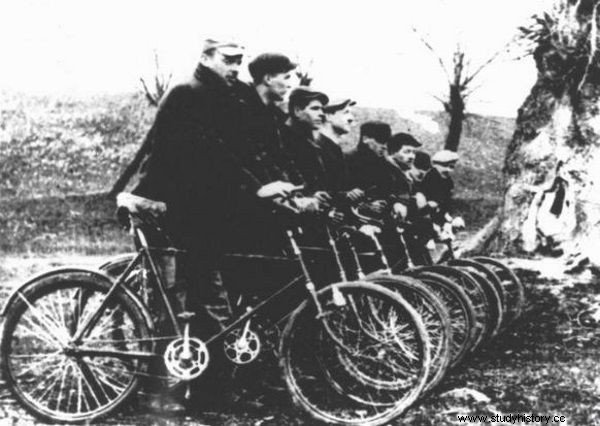
In addition to the units that became famous in the fight against the invaders, such as "Jędrusie" (in the photo), there were many ordinary bandits in Poland who only impersonated underground soldiers (photo:public domain).
One rolled the butter, the other the phonograph pins. When a woman living there noticed this to the commander, he shouted at his subordinates and immediately ordered them to return what they had stolen.
It turned out that this unit was rummaging throughout the town. As Danuta Warga-Ruszkiewicz noted in her memoirs:
They took some pigs in the village but didn't pay. They gave receipts with the stamp “Armia (or maybe Gwardia) Ludowa im. Tadeusz Kościuszko ” - to explain to the Germans why there is no pig.
Before the Home Army court
Such visits did not always have a happy ending. In turn, the behavior of the "guests" did not necessarily match the dignity of the uniform of the Polish army fighting for independence.
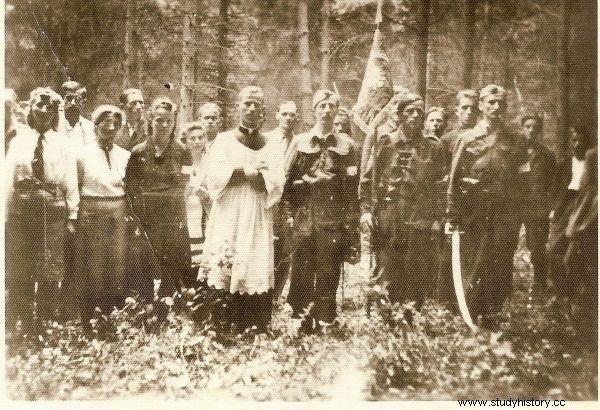
Usually the partisans collaborated with the clergy, not like in Zakliczyn on that unfortunate day. The photo shows the soldiers of the "Lech" Forestry Unit during the blessing of the banner (photo published under the CCA SA 2.0 license, unknown author).
In the Documents of the Judicial Commissions of the Home Army Headquarters, there is information about a truly bandit attack on the presbytery by a forest unit.
On the night of 24 X 44 in Zakliczyn several individuals in uniform and armed with automatic weapons and short pistols came to the presbytery to Fr. Kozub Jan where they threatened to take:
1 pig 100 kg live weight, 1 heifer 150 kg live weight, 1 pair of shoes and 4 loaves of bread - total value around PLN 50,000, they also demanded vodka and threatened Fr. Kozub that they could shoot him. The perpetrators were a wagon and one was on a dirty white horse.
After describing the above circumstances, the document contains a brief summary. As a result of the investigation, it was found out that behind the robbery was a gang headed by Division II of Żelbeta headed by Second Lieutenant Tadeusz.
Whatever method the guerrillas would use to obtain food, the real hunger was unlikely to be seen in their eyes. As Antoni Włodzimierz Madaliński, a shooter in the 7th Infantry Regiment "Garłuch" in the "Kampinos" Group, recalled, there was no shortage of food and supplies were always good.
His unit ate a lot of bread, drank sugar-sweetened coffee, and often lamb was cooked for dinner. More than one ordinary family of civilians living at the mercy of the Germans could only dream of such a menu. You can read about it in our other article.
***
"Okupacja od Kuchni" is a moving story about the times when illegal pig slaughtering could lead to Auschwitz, vegetables were grown in the courtyards of tenement houses, and used coffee grounds were traded on the black market. It is also an amazing cookbook:full of original recipes and practical tips from 1939-1945. We recommend!
